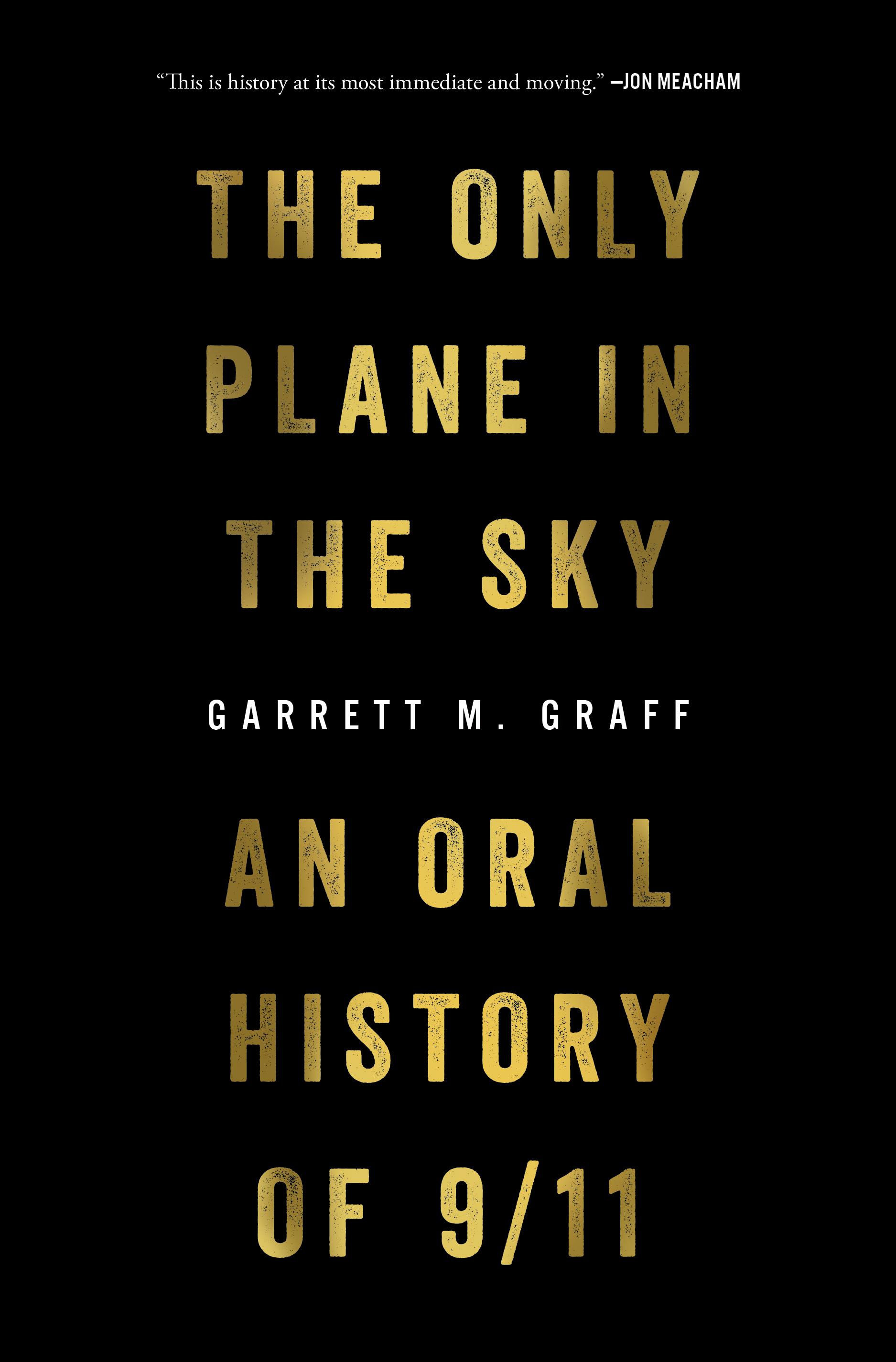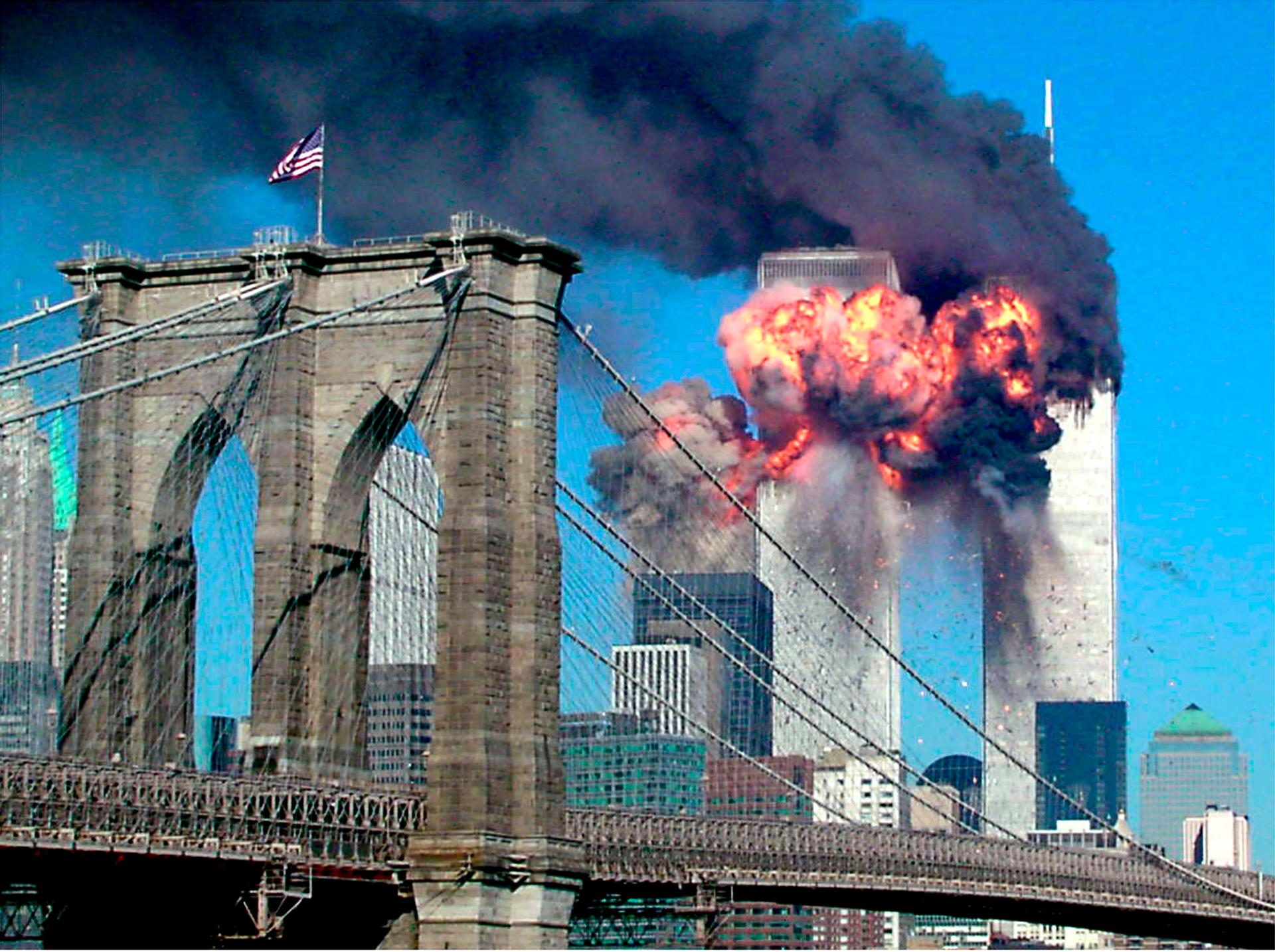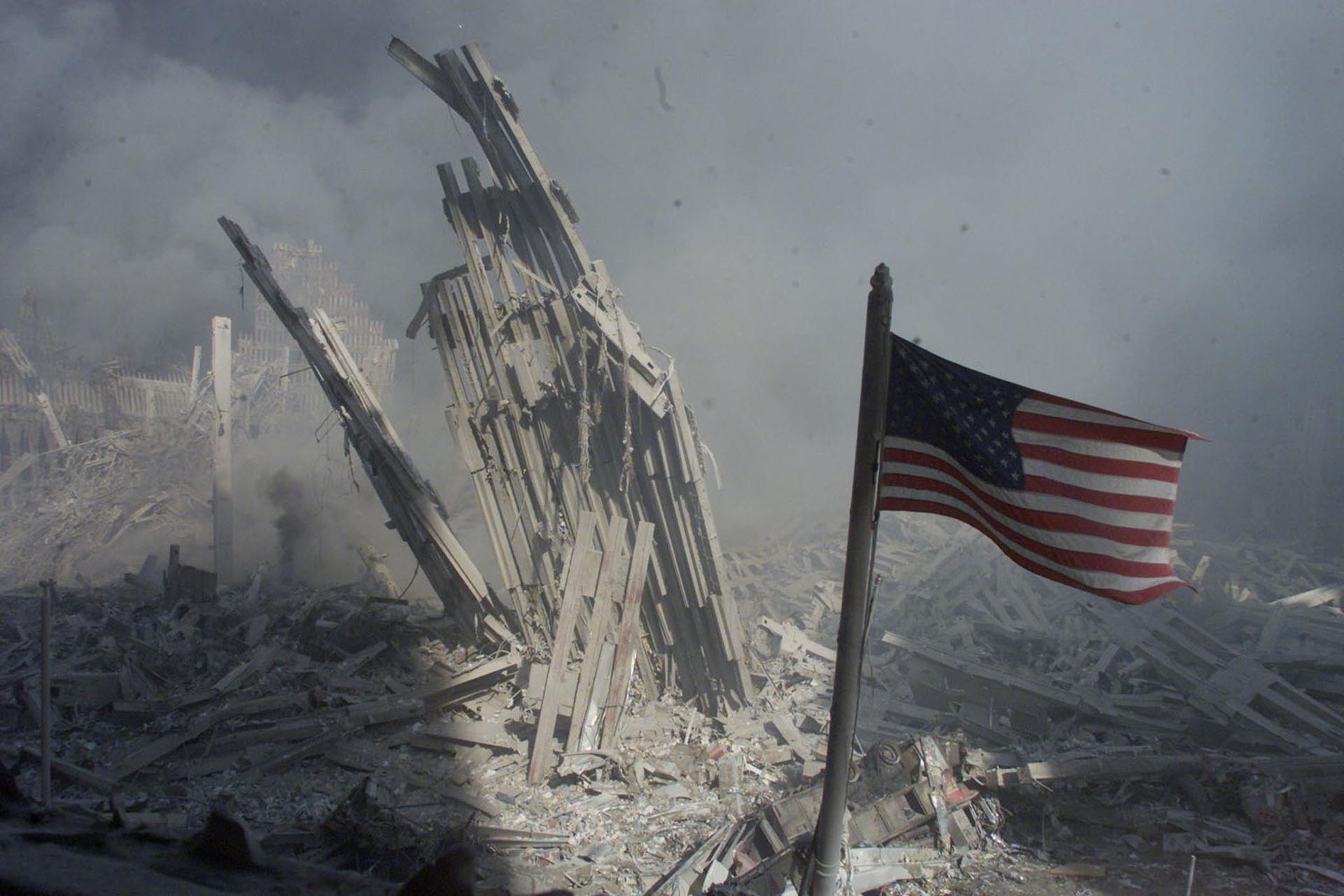An American flag flies near the base of the destroyed World Trade Center in New York, Sept. 11, 2001. Planes crashed into each of the two towers, causing them to collapse.
It’s been 18 years since the events of 9/11 rocked the United States, and the world. This fall, people born after one of the most defining moments of the 21st century are entering college. Others are joining the military — now able to fight in wars sparked by the attacks in 2001.
Related: Teens, born after 9/11, have a different perspective than those who lived through it

Author Garrett Graff says America is at a turning point in which the events of 9/11 are shifting from memory to history. In his book, “The Only Plane in the Sky,” he has compiled a comprehensive oral history of the day. The book is a timeline of Sept. 11, 2001, told via brief diary-like accounts, many intensely personal, from a broad range of Americans — flight attendants, high-ranking government officials, first responders and also people in New York and Washington going to work that day.
The book includes painful eyewitness testimonies, but other recollections capture a surprising innocence in the world at the very beginning of the 21st century. Near the beginning of the book, Peter Johansen, a New York City ferry captain, recalls the mundane initial reactions of passengers commuting to work, before people understood what was happening.
“Honestly, I think most people felt it was a navigation accident,” Johansen said. “The reason I say that is, our ferry continued around Pier 11, the Wall Street terminal, and there are about 100 people on board. Every single one of them got off and went to work that morning. And as they’re walking off, there are envelopes and letters floating down from sky.”
Author of “The Only Plane in the Sky” Graff joined The World’s Marco Werman to speak about this moment in the American national memory.
Garrett, what did Peter Johansen see the morning of 9/11?
His quote captures one of the most amazing aspects of trying to revisit and understand what that day was like for people to experience. And it’s just how innocent America truly was that morning. You know, we hear that 9/11 changed everything. We say it sort of flippantly today without really remembering just how different our country was on that Tuesday morning in September, 18 years ago.
Every one of those commuters got off the boat and walked into their jobs at lower Manhattan, even as papers and envelopes fluttered down from the impact zone above. And what it captured, to me, was this idea that so much of America looked at that first crash on 9/11 and assumed it was an accident, assumed it was a problem with the plane, a pilot having a heart attack, a problem with air traffic control. And of course, this is just almost unimaginable to us today, this innocence.
You saw that video last month of the motorcycle backfiring in Times Square and everyone running for their lives. You know, we hear a noise today, something weird happens in a public place and we default to thinking that it’s terrorism, that it’s an attack, that it’s a shooting, and that’s just really not where America was on 9/11.
Related: His brother was murdered for wearing a turban after 9/11. 15 years later, he spoke to the killer.
Some of the testimonies from people you spoke with really convey also the helplessness of the onlookers. Commander Frank Culbertson was an astronaut on the international space station — the only American, as you say, not on Planet Earth that day. Here is Culbertson describing what he saw peering out of his spacecraft window on 9/11:
Culbertson: “As we zoomed in with the camera, you could see the big cloud enveloping New York City. And we were watching the second tower come down. And traveling five miles a second, New York goes across the horizon very quickly and it was a long 90 minutes to come back around and check out my country again. And it just — it just really hurt.”
Watching from space was probably the only way to get a bigger picture of that day. He even saw Air Force One’s contrails heading back to Washington because, as he said, planes were grounded and the sky was clear as a bell. Garrett, we’ve already had extremely detailed explanations of why and how 9/11 happened. Why did you compile these accounts?
To me, it was trying to recapture the experience of 9/11. This year, this anniversary, the 18th — it sort of marks a moment as the nation shifts from the 9/11 as memory to 9/11 as history. You have the first college class of students coming in [who are] born after 9/11. You have the first American servicemen and women this year being deployed to the war zones of Afghanistan and Iraq and to guard prisoners at Guantanamo Bay who were captured on battlefields before they were even born. And we remember the facts of the day when 9/11 comes around. But the facts of the day are, in some ways, less important, I think, to our national memory than the experience of the day. Because it really was the way that we experienced that day, the way that America lived it, coast to coast, morning to night, that drove so much of the decision-making that came after.
Related: Post-9/11 law could allow president to bypass Congress to wage war with Iran
Going back to some of the testimonies, Garrett, you sat down with Andy Card, who was chief of staff at the White House for President George W. Bush. Here is Andrew Card reading his recollections for you of how he broke the news to the president, who was visiting a school in Florida that day:
Card: “I decide to pass on two facts and an editorial comment. I didn’t want to invite a conversation because the president was sitting in front of second-grade students in that classroom. The teacher asked the students to take out their books. So I took that opportunity to approach the president. I whispered in his ear, ‘A second plane hit the second tower. America is under attack.’ I took a couple of steps back so he couldn’t ask me any questions.”

I have to say some of these accounts, Garrett, are really tough to read. It’s stuff people may recall from 2001, but perhaps it was stuff that was just so horrifying they had to turn away at the time. You have witnesses who saw some of those people as they went to work in the World Trade Center, but were incinerated on the spot by fireballs after the first impact of the planes. Others got really severely burned and lived. Did you meet any of them and where in the world are they and how are they getting on with their lives?
Well, I tell the story in the book of Will Jimeno, Port Authority police officer, one of only two people who was actually rescued from under the towers. It was him and his sergeant, John McLoughlin, the only two people who survived from underneath the towers that day. Will Jimeno is very forthright about the challenges that he faces in his life, the long path that he has had back. He says, you know, “The day that I beat PTSD will be the day that they lay me in the ground.”
But at the same time, you know, he has this sort of very inspirational story that he tells about how, yes, he had 220 stories of the World Trade Center fall upon him, but in each of our own lives we have our own World Trade Centers, is what he says. We have our own things that seem like they are challenges that we could never overcome and that it’s really about how you respond to the challenge that defines who you are and how you’ll live your life.
Wow that is some kind of perspective. You also sat down with Col. Mark Tillman, who piloted Air Force One that day. Here’s Tillman reading his account from your book.
Tillman: “I went down to the tarmac to see about having the plane refueled. The plane could carry 14 hours of fuel. I wanted a full tank. It turned out we’d happened to park over a hot refueling tank they used for the bombers. This civilian is arguing with our crew. He says the fuel pits are only authorized for use in time of war. An Air Force master sergeant, God bless him, overhears this and roars, ‘We are at war!’ He whips out his knife and starts cutting open the cover.”
Graff: That quote from Colonel Tillman sort of comes toward the end of the day. You know, the president was hustled aboard Air Force One in Sarasota. They took off, sort of flew around the southeastern United States in the Gulf of Mexico until they could find a safe place to land and landed at Barksdale Air Force Base. And everyone gets off the plane and they are surrounded by armored vehicles and men with machine guns and in flak jackets, and sort of realize that in the time that they have been in the air, the nation has gone to war, that they are landing back into a country that is forever changed and certainly an environment that has been dramatically changed.
Related: Al-Qaeda is stronger today than it was on 9/11
I got goosebumps from your description of that just now, just saying. Your book includes many more accounts, though, from men than from women. Why do you think that is?
The attacks hit the financial sector in New York — the twin towers — and the military centers at the Pentagon — both sort of heavily male industries. And then many of the first responders are male. And it is one of the things that sort of comes through in a lot of the book … is just how heavily male so much of the story of that day ends up being.
You met the people who gave these accounts for the book some years after 9/11. I’m wondering, with the remove of time, can you start to see the gears starting to shift in their accounts in terms of how innocent they were and [how], years later, were not?
One of the things that I really tried to capture as I was going back and telling these stories in their own voices was [that] the story that we tell about 9/11 today is much neater and seems cleaner than it was when we experienced it on 9/11. I mean, we know that the whole attack takes place in just 102 minutes from that first crash to the collapse of the second tower. And that’s not how any of us experienced it on 9/11.
Well into the afternoon we were worried about other hijacked planes in the air. There were evacuations and potential threats and fears in Chicago. They closed Disney that day. They grounded every plane in the country. And we worried about follow-on attacks. We worried about sleeper cells, you know. We worried that there were more attacks coming later that day, the next day, the next month. And that, really, we just didn’t have a good understanding of what we were experiencing that day.
And trying to understand, I think, all that has unfolded since — I mean, even up until this week you have the Taliban peace talks collapsing — a direct result of the actions that we took after 9/11. We’re still living in this post-9/11 world shaped by the decisions that policymakers made out of the fear, the trauma, the chaos and the confusion that they lived on 9/11.
Related: Trump abruptly canceled Afghan peace talks. What comes next?
Garrett, we’re going to close with one more excerpt from the book, “The Only Plane in the Sky,” spoken by Beverly Eckert, the wife of Sean Rooney who was working in the South Tower in New York City.
Eckert: “We met when we were only 16 at a high school dance. When he died, we were 50. I remember how I didn’t want that day to end, terrible as it was. I didn’t want to go to sleep because as long as I was awake, it was still a day that I shared with Sean. He kissed me goodbye before leaving for work. I could still say that was just a little while ago. That was only this morning.”
This interview has been edited and condensed for clarity. Audio excerpts courtesy of Simon & Schuster. Audio from “The Only Plane in the Sky” by Garrett M Graff, read by a full cast and used with permission.
Our coverage reaches millions each week, but only a small fraction of listeners contribute to sustain our program. We still need 224 more people to donate $100 or $10/monthly to unlock our $67,000 match. Will you help us get there today?
